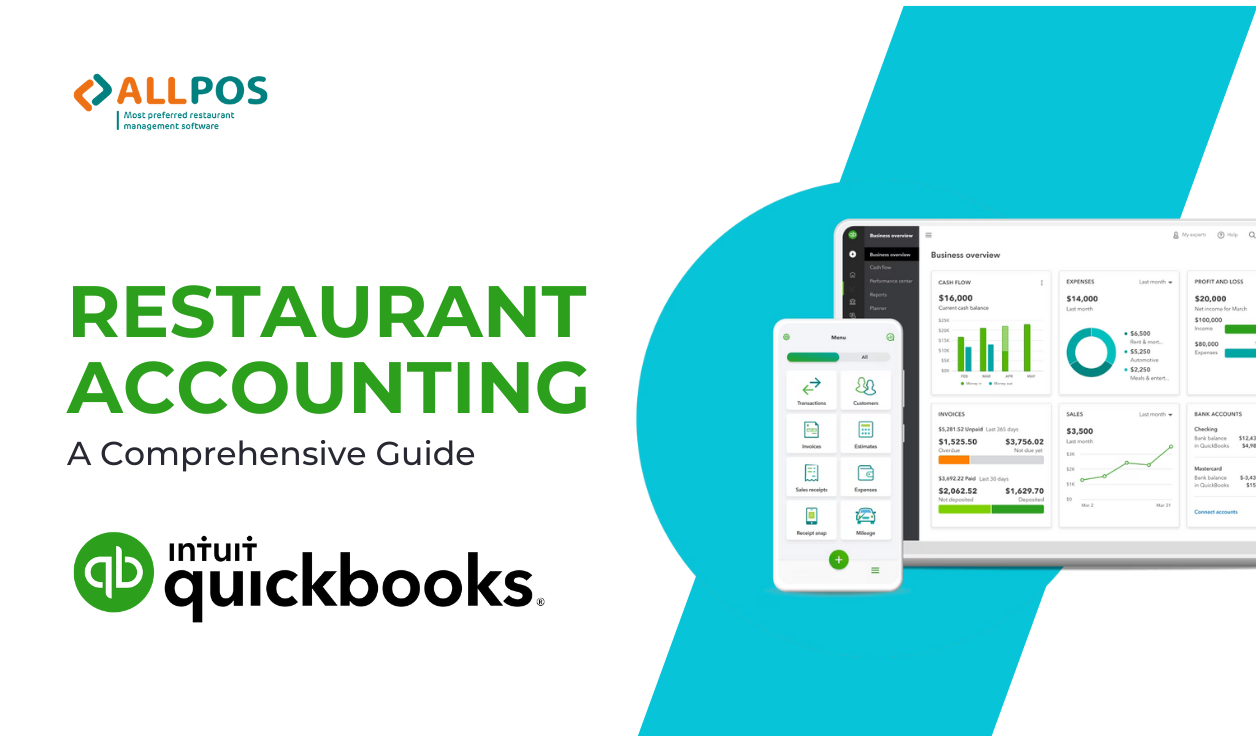Restaurant Accounting Essentials: A Comprehensive Guide

Restaurant owners and managers know that running a successful establishment involves much more than serving delicious food. Proper accounting is essential for managing expenses, maximizing profits, and ensuring financial stability. In this blog post, we will delve into restaurant accounting, exploring what it is, its benefits, and how to effectively handle it. We'll also take a closer look at QuickBooks, a popular accounting software, and discuss how ALLPOS integrates seamlessly with it.
What is Restaurant Accounting?
Restaurant accounting refers to the specialized financial management practices and processes tailored to the unique needs of the food service industry. It involves tracking income, managing expenses, and maintaining accurate financial records to make informed decisions and meet regulatory requirements.
Benefits of Proper Restaurant Accounting:
Financial Control:
Effective accounting allows you to track your restaurant's income and expenses, giving you a clear picture of your financial health. This control helps identify areas where cost savings are possible.
Tax Compliance:
Restaurants are subject to various tax regulations. Proper accounting ensures that you meet your tax obligations, avoid penalties, and take advantage of available deductions.
Budgeting and Planning:
With accurate financial data, you can create budgets and make informed decisions about expansion, menu changes, and staffing levels.
Investor and Lender Confidence:
Well-maintained financial records instill confidence in potential investors and lenders, making it easier to secure funding for your restaurant's growth.
Profit Maximization:
Understanding your profit margins helps you optimize menu pricing and cost control strategies, ultimately increasing profitability.
How to Do Bookkeeping for a Restaurant:
Effective restaurant bookkeeping involves several key steps:
Record All Transactions:
Maintain a detailed record of all income and expenses. This includes sales, payroll, inventory costs, rent, utilities, and more.
Separate Personal and Business Finances:
Keep your personal and restaurant finances separate to avoid confusion and ensure accurate accounting.
Implement a Point of Sale (POS) System:
A modern POS system can streamline sales tracking and inventory management, reducing errors and improving efficiency.
Track Inventory:
Regularly update your inventory records to monitor ingredient usage and minimize waste.
Reconcile Bank Statements:
Regularly reconcile your bank statements to ensure your recorded transactions match those in your bank account.
Create Financial Statements:
Generate profit and loss statements, balance sheets, and cash flow statements to assess your restaurant's financial performance.
QuickBooks - Accounting Software
QuickBooks is a popular accounting software choice for restaurants. Here are five important features that make it a valuable tool:
Customizable Chart of Accounts:
QuickBooks allows you to create a tailored chart of accounts to suit your restaurant's specific needs. This flexibility ensures you can track income and expenses accurately.
Integration with POS Systems:
QuickBooks can seamlessly integrate with many POS systems, allowing for automatic data synchronization, reducing manual entry errors, and saving time.
Financial Reporting:
QuickBooks provides a wide range of customizable financial reports, including profit and loss statements, balance sheets, and cash flow reports. These help restaurant owners gain insights into their financial health.
Payroll Management:
QuickBooks offers payroll services that simplify employee wage tracking, tax calculations, and compliance with labor regulations, which is crucial for the restaurant industry.
Mobile Accessibility:
QuickBooks has mobile apps, allowing you to access your financial data on the go. This feature is particularly useful for restaurant owners who are constantly on the move.
ALLPOS Integration with QuickBooks:
ALLPOS is a comprehensive restaurant management system that integrates seamlessly with QuickBooks. Here's how this integration can benefit your restaurant:
Streamlined Data Transfer:
ALLPOS and QuickBooks integration ensures that sales, expenses, and other financial data are automatically transferred to your accounting software, reducing the risk of errors and saving time.
Real-Time Financial Insights:
With real-time data synchronization, you can access up-to-date financial information, allowing for better decision-making.
Inventory Management:
ALLPOS can track inventory levels and costs, making it easier to maintain accurate inventory records in QuickBooks.
Tax Compliance:
By automating data transfer, you can ensure that your restaurant remains compliant with tax regulations and avoids costly mistakes.
Enhanced Efficiency:
The integration between ALLPOS and QuickBooks streamlines restaurant operations, improving overall efficiency and reducing administrative overhead.
In Conclusion
In conclusion, restaurant accounting is a crucial aspect of running a successful food service business. Proper accounting practices can help you maintain financial control, meet tax obligations, and maximize profitability. Utilizing accounting software like QuickBooks, especially when integrated with systems like ALLPOS, can simplify the process, save time, and provide valuable insights into your restaurant's financial health. By mastering restaurant accounting, you can pave the way for long-term success in the competitive restaurant industry.